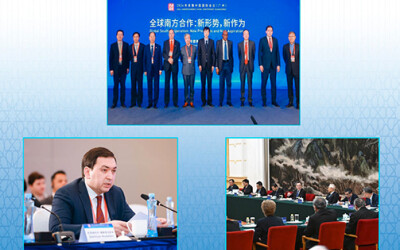Akramjon Nematov: Central Asia is transforming into a hub of water and climate diplomacy

This view was expressed by Akramjon Nematov, First Deputy Director of the Institute for Strategic and Regional Studies (ISRS) under the President of Uzbekistan, during an expert dialogue on water scarcity in Central Asia held at the Friedrich Ebert Foundation headquarters in Berlin on November 28.

Speaking at the panel session attended by CA experts, deputies, specialists from ministries and departments of the Federal Republic of Germany, representatives of leading scientific, educational and analytical centres of Germany, Akramjon Nematov gave a detailed presentation on the integrated strategy in the water sector implemented by Uzbekistan.
According to him, fundamental changes have taken place in this area in recent years; for the first time in the national development strategy of Uzbekistan, water conservation issues have been made a separate priority area of state policy; the Concept for the Development of Water Management until 2030 has been adopted and is being consistently implemented, on the basis of which short-term strategies for water resources management and development of the irrigation sector are being developed; institutional mechanisms for integrated management of the water management sector are being improved.
It was noted that the adoption of the Water Code, designed to systematise disparate legal acts and thus improve the effectiveness of the unified state water policy, is on the agenda.
The expert emphasised that the new legislative act providing for the establishment of the Water Council would strengthen the integrated and intersectoral approach to water resources management, aimed at introducing the principles of market economy and public-private partnership (PPP) in the water sector and increasing the responsibility of water users.
The representative of ISRS also highlighted the significant intensification of cooperation between the Central Asian states in the water sector, measures to improve the activities of the International Fund for Saving the Aral Sea, and elaboration of a regional agreement on rational use of water resources.
It was noted that for effective coordination of actions in this direction, water-climate dialogue is supported and expanded in the region, Central Asian University of environmental studies and climate change was established in Tashkent, Regional Program “Green Agenda” for Central Asia and Regional Strategy on Adaptation to Climate Change were adopted for the first time.
According to the expert, today Central Asia, in fact, is turning into a hub of water and climate diplomacy and is actively involved in the global dialogue on climate change. In particular, he said that in 2025-2028, the countries of Central Asia will host five large-scale forums under the auspices of the United Nations dedicated to water and climate issues.
Discussing further prospects for cooperation in the water sector, the expert highlighted several promising areas:
Firstly, according to Akramjon Nematov, the Central Asian states have a deep understanding of the problems in the water sector and large-scale plans to solve them. At the same time, the most priority task today is to attract financing to the water sector. Referring to EDB data, the expert pointed out that in the next six years, the investment deficit in Central Asia's water sector alone will reach approximately $12bn or $2bn/year, which is significantly higher than in the previous 15 years, when IFIs allocated $4bn for these tasks.
Under conditions of investment outflow from developing countries, this is a big challenge, noted the representative of ISRS and emphasised the importance of developing and introducing “blue” financing instruments in Central Asia, studying and disseminating best practices of involving private capital and financial market in investing in water-climatic projects, stimulating the development of public-private partnership and outsourcing mechanisms in the water sector, and making full use of internal reserves.
Secondly, as the expert noted, in order to develop scientifically sound decisions in the area under consideration, it is important to have an accurate diagnosis regarding the impact of climate change on water resources in Central Asia in the long term. In this regard, according to him, it is necessary to form a common regional research platform, a single database and coordinated implementation of complex transboundary research work based on an interdisciplinary approach.
Thirdly, according to the ISRS representative, the creation of a common educational space in the water sector in Central Asia is of particular relevance.
According to experts, in 2035-2040 the expected need for specialists in the water sector in Central Asia may amount to about 180-200 thousand people. "Under these conditions, the key task is to improve national educational programs and training standards for water specialists," Akramjon Nematov emphasized.
According to him, the Central Asian University of environmental studies and climate change, established in 2023 by the Decree of the President of Uzbekistan, as well as the Tashkent Institute of Irrigation and Agricultural Mechanization Engineers, which is among the Top 500 recognized universities in the world, could become the driving forces of such a process.
It was emphasized that joint educational programs would contribute not only to increasing the scientific potential of our countries, but also to strengthening the trusting interaction of specialists in the field of water management in the future.
Fourthly, the need for developing prompt and adequate measures to respond to extreme weather events, droughts, precipitation and mudflows was noted.
According to Akramjon Nematov, Central Asia is most acutely feeling the effects of climate change, is facing an increase in extreme weather events, which affects the existential foundations of the life of our states.
Along with this, in recent years a new trend has been observed - volley downpours that lead to flooding, inundation and the occurrence of mudflows.
In these conditions, the need is emphasized not only for a deep study of the consequences of these phenomena, but also for the formation of a regional system for forecasting, warning, early warning and joint response to natural disasters and extreme climate events.
Fifthly, the expert emphasized the importance of widespread implementation of advanced practices to improve the efficiency and productivity of water use, especially in agriculture, which currently consumes more than 90% of the region's water resources
Akramjon Nematov noted that, according to international organizations, a decrease in water resources in the Syr Darya basin is expected by 2050 - up to 5%, in the Amu Darya basin - up to 15%, and by 2100 they may decrease by 30% and 40%, respectively.
According to the ISRS representative, the way out of this difficult situation may be the widespread introduction of water-saving technologies.
“The main task is to create effective mechanisms for transfer of water saving technologies that can ensure practical implementation of the best practices for efficient use and management of water resources and reduction of their irrational consumption. This will allow us to get the maximum benefit from the existing water infrastructure”, Nematov said.
Sixthly, as the expert pointed out, the issues of improving water accounting and distribution mechanisms have become much more topical today.
According to the ISRS representative, at present, water accounting of transboundary rivers in Central Asia is carried out by automated gauging stations, the number of which is limited and does not allow obtaining complete information on water use in all river reaches.
This circumstance, the expert believes, prevents obtaining actual and reliable data along the entire length of the Amu Darya and Syr Darya, which hinders the implementation of effective transboundary water resources management.
“It is necessary to increase the number of automated gauging stations to record the flow of the Amu Darya and Syr Darya, introduce new technologies to control the use of water resources and effectively manage water distribution for the needs of agriculture and energy”, Nematov concluded.
Previous

On November 30, the University of World Economy and Diplomacy hosted a lecture by Eldor Aripov, Director of the Institute for Strategic and Regional Studies under the President of the Republic of Uzbekistan, on the topic: “Central Asia: Cross-Border Challenges and Threats”.
03.12.2024Next

The annual 2024 Understanding China Conference, themed “Carry through the Reform to the End – Chinese Modernization and New Opportunities for World Development”, was held in Guangzhou from 2 to 4 December.
05.12.2024





